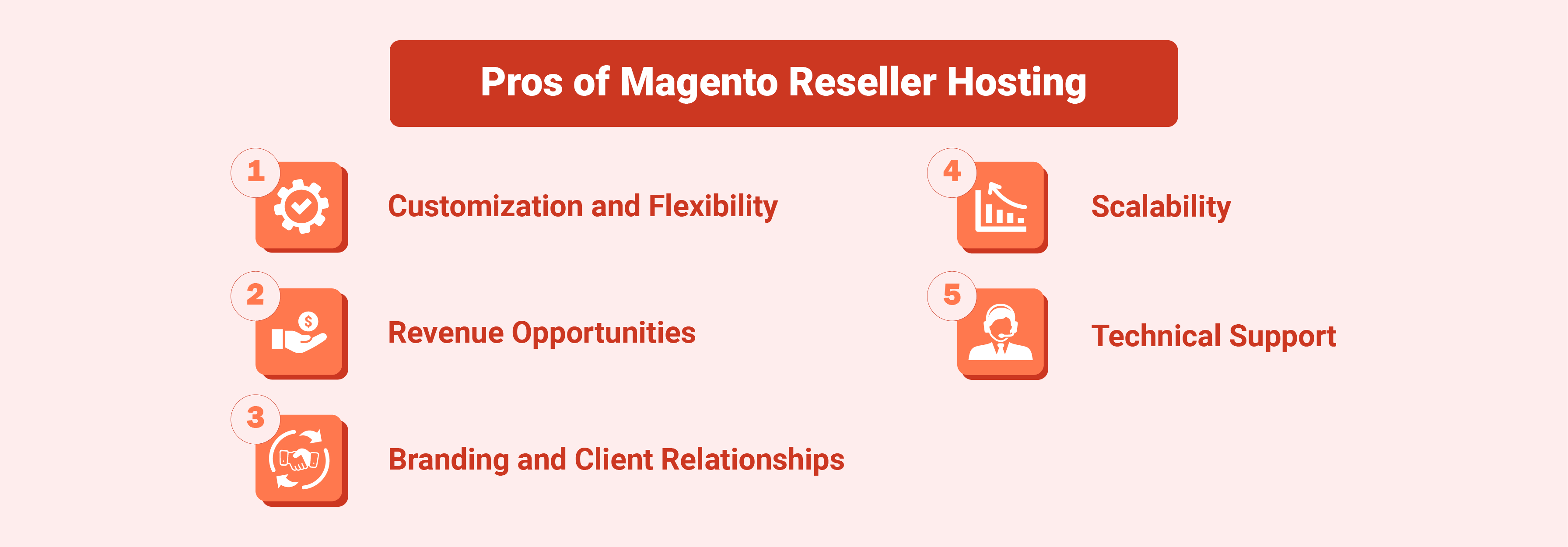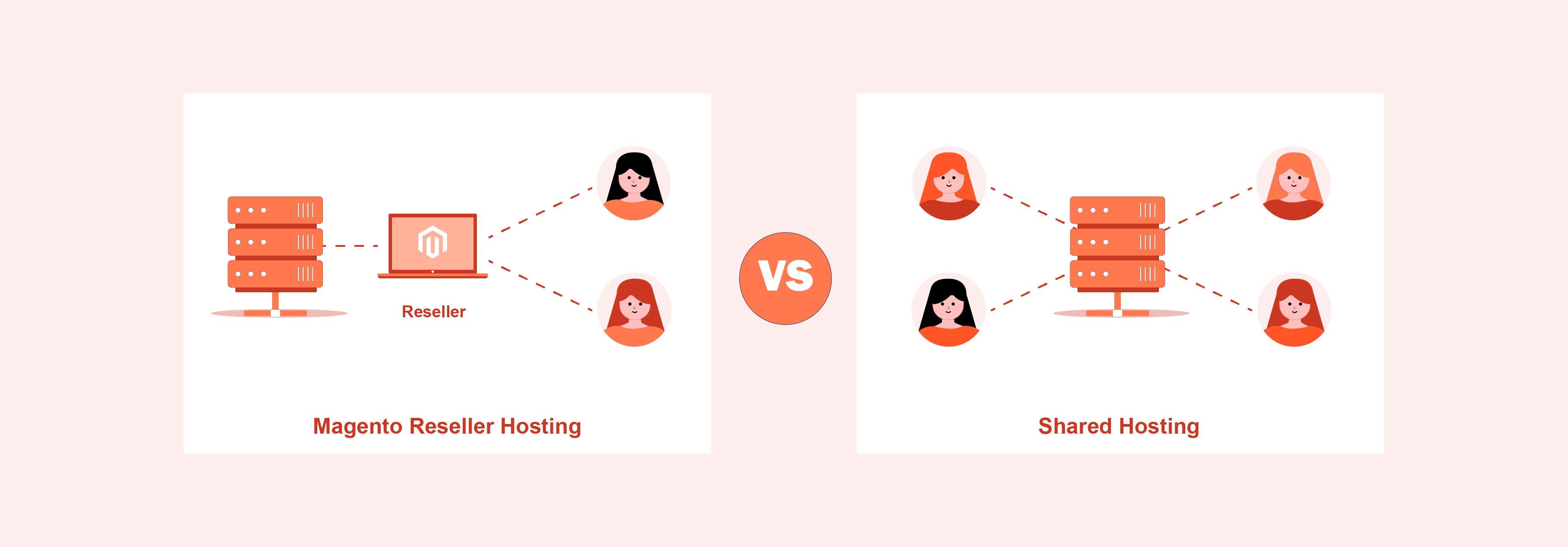
What is Magento Reseller Hosting? Comparison with Shared Hosting
Did you know that your e-commerce platform can also empower others' ventures? Let's look into Magento reseller hosting. It lets individuals or businesses resell web hosting services to their clients under their brand. We'll explore how it stands apart from shared hosting, focusing on customization, scalability, and security.
Key Takeaways
-
Magento reseller hosting lets you offer custom hosting solutions under your brand for Magento sites.
-
This article explains Magento reseller hosting and its differences from shared hosting.
-
Key features include customization, flexibility, pricing freedom, and front-line support responsibility.
-
Pros include customization, revenue opportunities, branding, scalability, and support.
-
Cons include initial investment, support responsibility, dependency, competition, and limitations.
What is Magento Reseller Hosting?

Magento reseller hosting allows resellers to purchase hosting services in bulk from a primary provider. Then, they can sell those services under their branding. It is designed for those looking to offer Magento eCommerce hosting to their clients.
How Magento Reseller Hosting Works

Magento Reseller Hosting operates through a partnership between the reseller and the primary hosting provider. This relationship allows the reseller to offer customized hosting solutions to their clients.
Below are the steps and components involved in how Magento Reseller Hosting functions:
1. Purchasing Bulk Hosting Plans
-
Resellers purchase hosting plans in bulk from a primary provider.
-
These plans come with a set amount of resources that can be distributed among multiple clients.
2. Customization and Branding
-
Resellers can customize the hosting packages to meet the specific needs of their clients.
-
They can use branding to control panels and customer communications to maintain a consistent business identity.
3. Allocation of Resources
-
Resellers divide the bulk resources into smaller packages.
-
They then allocate these packages to their clients based on individual Magento requirements.
4. Setting Up Client Accounts
-
Resellers set up hosting accounts for their clients.
-
They manage these accounts through a reseller control panel provided by the hosting provider.
5. Pricing and Billing
-
Resellers determine the pricing for the hosting services they offer.
-
They are responsible for billing their clients directly.
6. Providing Client Support
-
Resellers act as the first point of contact for their clients' support needs.
-
They may handle basic inquiries and issues themselves.
-
They escalate to the primary hosting provider’s support team for more complex issues.
7. Maintenance and Upgrades
-
The primary hosting provider is responsible for server maintenance, updates, and security.
-
Resellers ensure that their clients' hosting environments are optimized and running smoothly.
Pros of Magento Reseller Hosting

1. Customization and Flexibility
-
Tailor hosting packages to meet the specific needs of your clients.
-
Offer a range of services, from email hosting to managed eCommerce solutions.
2. Revenue Opportunities
-
Set your pricing structure for the resold hosting services.
-
Generate a steady income by adding a markup to the wholesale price.
3. Branding and Client Relationships
-
Brand the Magento hosting service as your own to build your business identity.
-
Strengthen client relationships by being their go-to for hosting and technical support.
4. Scalability
-
Easily adjust resources and services as your clients' businesses grow.
-
Scale up or down based on demand without significant infrastructure changes.
5. Technical Support
-
Access to the primary provider's technical support for complex issues.
-
Offer personalized front-line support to enhance client satisfaction.
Cons of Magento Reseller Hosting
1. Initial Investment
-
Requires an upfront investment to purchase the reseller package.
-
This may include additional costs for marketing and client acquisition.
2. Responsibility for Support
-
You are the first point of contact for your clients' support needs.
-
Managing support inquiries can be time-consuming and requires technical knowledge.
3. Dependency on the Provider
-
Your service quality is tied to the reliability and performance of the primary hosting provider.
-
Any downtime or issues on their end can directly impact your clients.
4. Competition
-
The hosting market is highly competitive, with many options available for end-users.
-
Differentiating your service and proving value can be challenging.
5. Technical Limitations
-
Some aspects of server management and configuration may be beyond your control.
-
You may be limited by the capabilities and restrictions of the primary provider's platform.
Magento Reseller Hosting: Ideal Use Cases
1. Growing eCommerce Businesses
Web Scaling: It offers scalable options for growing online stores. These options accommodate increasing traffic and resource needs.
Customization: Businesses can customize hosting environments. This customization meets the unique demands of each eCommerce business.
2. Web Developers and Agencies
-
Multiple Client Management: Ideal for managing hosting for multiple clients. It allows for centralized control and billing.
-
Added Value Services: Developers and agencies can offer hosting as an additional service. This enhances their portfolio and client relationships.
3. Entrepreneurs Looking to Enter the Hosting Business
-
Low Barrier to Entry: The infrastructure is managed by the primary provider. This setup allows entrepreneurs to start a hosting business without a significant upfront investment.
-
Market Niche Focus: Focusing on Magento hosting can differentiate new providers. It targets a specific and lucrative niche.
4. IT Consultants Specializing in eCommerce Solutions
-
Integrated Services Offering: Consultants can bundle hosting with their consultancy services. This provides a one-stop solution for their clients.
-
Enhanced Performance and Security: Consultants ensure their clients receive optimized hosting. This hosting is designed for Magento, improving site performance and security.
Comparing Magento Reseller Hosting with Shared Hosting

Choosing the right hosting solution for a Magento website involves considering factors like performance, scalability, security, customization, and cost. Below is how Magento Reseller Hosting compares with Shared Hosting across these key aspects:
1. Performance
Shared Hosting
Limited by shared resources: Websites on shared hosting share server resources. It can lead to slower response times and reduce performance during peak traffic periods. This setup might not be optimal for a high-traffic Magento store. It also may not suit a Magento hosting provider looking to offer the best experience.
Magento Reseller Hosting
Enhanced by dedicated resources: Offers dedicated resources for each Magento site. This ensures higher reliability and faster load times. It is beneficial for businesses to prioritize the performance of their Magento hosting plan. It is also ideal for those seeking the best Magento hosting solution.
2. Scalability
Shared Hosting
Limited scalability options: Scaling resources to accommodate traffic spikes can be challenging on a shared server. This can be a significant limitation for Magento websites aiming for growth.
Magento Reseller Hosting
Easy to scale up resources as needed: With Magento Reseller Hosting, adjusting resources like bandwidth and storage is straightforward. It is ideal for a Magento hosting provider supporting rapidly growing Magento stores.
3. Security
Shared Hosting
Basic security features: Offers standard security measures. These may not be sufficient for a Magento site requiring robust protection. Shared hosting often includes a free SSL certificate. However, it may lack advanced security options.
Magento Reseller Hosting
Advanced security options and customization: Provides enhanced security features tailored for Magento hosting. This includes customized firewalls and dedicated IP addresses. Such a level of security is crucial for Magento stores handling sensitive customer data.
4. Customization and Control
Shared Hosting
Limited customization and control: Users have restricted access to server settings. This can limit the ability to optimize a Magento site fully.
Magento Reseller Hosting
High degree of customization and control: Allows for extensive customization of the hosting environment. This includes server configurations and software installations. Managed Magento web hosting services must aim to provide optimized solutions.
5. Cost
Shared Hosting
Lower initial cost: Generally offers a cost-effective solution for startups, SMBs, and new websites. It is an attractive option for new Magento stores or those with limited budgets.
Magento Reseller Hosting
Higher initial cost but with more features and capabilities: While more expensive upfront, Magento Reseller Hosting provides greater value. It suits Magento hosting providers and businesses needing advanced features. This includes cloud hosting or VPS hosting options.
6. Ideal for
Shared Hosting
Small websites with low traffic: Suitable for new or small Magento sites, with dedicated hosting options available for larger sites.
Magento Reseller Hosting
Growing businesses, web developers, and agencies: Perfect for managing multiple Magento sites. It also suits those requiring scalable, secure, and customizable hosting solutions. It supports various hosting needs, from cloud hosting for Magento to specialized Managed Magento web hosting.
FAQs
1. How do I install the Magento eCommerce platform?
First, to install the Magento eCommerce platform, ensure your hosting meets the requirements. Most managed Magento hosting providers offer one-click installation through their control panels.
After purchasing a plan, you can typically find the installation option in your hosting account dashboard. Follow the steps, including setting up a database and configuring your admin account.
2. Who are the best Magento hosting providers?
The best Magento hosting providers specialize in offering optimized environments specifically for Magento. Key players include companies that offer managed Magento hosting. They also provide Magento cloud hosting. Additionally, there are those with hosting platforms optimized for Magento. These providers ensure high performance and reliability and offer Magento-specific support.
3. What is managed Magento hosting?
Managed Magento hosting refers to a service where the hosting provider manages all the technical aspects of running Magento. This includes security, updates, backups, and performance optimization. This type of hosting is ideal for businesses without a technical team and who wish to focus on their store rather than server management.
4. Does Magento's and Magento 2's hosting requirements differ?
Yes, Magento 2 has updated system requirements compared to its predecessor. Most noteworthy is its need for PHP 7.3 or later, additional extensions, and a supported database like MySQL 5.7. Magento hosting providers usually indicate if their hosting plans are compatible with Magento 2.
5. Can I use Magento cloud hosting for a small web hosting plan?
Magento cloud hosting is typically scalable. It can suit various hosting needs, from small projects to large-scale enterprises. It offers flexibility in scaling resources according to traffic demands. This can be advantageous for eCommerce stores with fluctuating traffic levels. However, assess if the cost aligns with your budget. Cloud hosting can be pricier than traditional shared hosting.
6. How do I choose the right type of hosting for my Magento eCommerce site?
When selecting hosting for a Magento eCommerce site, consider factors like site size, traffic, budget, and technical expertise. Shared hosting might suffice for new or small stores. Growing businesses may need the scalability and enhanced performance of cloud or VPS hosting.
Companies with high traffic and specific performance needs should think about managed Magento cloud or dedicated Magento hosting. Opt for hosting optimized for Magento for the best performance and support.
Summary
Magento reseller hosting benefits web agencies and freelancers who aim to provide full eCommerce solutions. Here are key tips of using reseller hosting effectively:
-
Custom Fit: Tailor hosting to each client's unique Magento needs.
-
Brand Power: Resell under your brand, enhancing client trust.
-
Revenue Growth: Set pricing and markups for steady income.
-
Scalability: Adapt resources for client growth effortlessly.
-
Support Mastery: Offer direct support, backed by the provider for complex needs.
Ready to optimize your Magento site's performance?
Managed Magento hosting ensures expert guidance, top security, and performance to handle Magento traffic.



